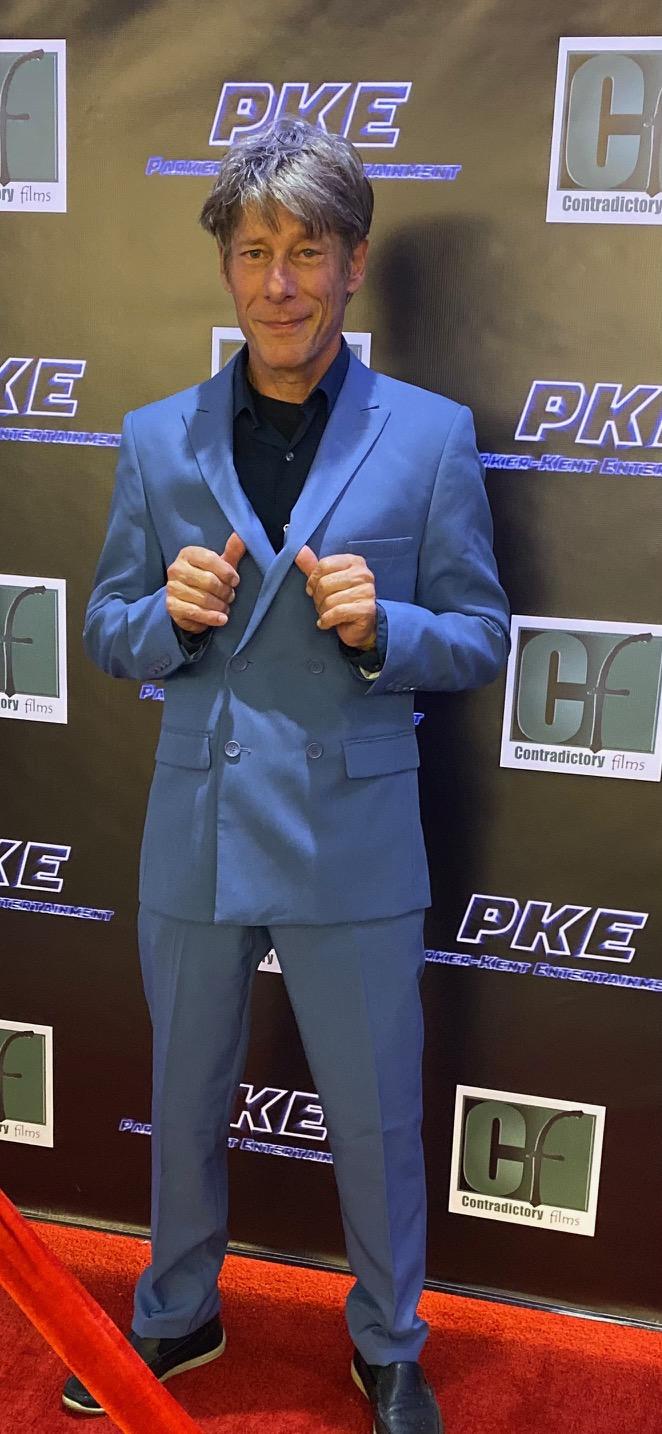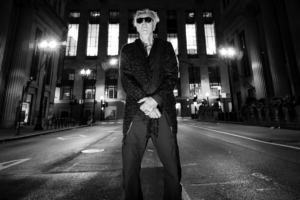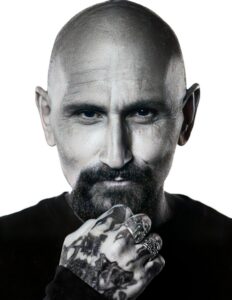Kevin Scott Allen – Actor & Storyteller

1. Can you share with us your journey from growing up in various states to pursuing a career in acting? How did your diverse upbringing influence your approach to storytelling?
Growing up in various places, never going to the same school for more than a year except for my first grades, 1-3, then my junior and senior year of high school, I became used to making new friends all the time. The bad part was that I was never able to get close to anyone. I think that made me try to connect with everyone I met as quickly and deeply as I could because I never knew how long they’d be in my life. In storytelling, you have to connect with your audience as fast as you can, or they lose interest. You can’t dally around. That is something I learned early on. I was lucky in that I got a break in acting when I was seven years old. My agreement with my parents was that I could act in the summer if I attended school throughout the rest of the year. So, I traveled out to California in the summers to act, staying with an uncle. I worked every summer, then went back to school in the Fall. As for my diverse upbringing, it taught me to think abstractly, not to see the world in black and white, but as a varied universe
2. Your early stage experience includes performances at the Globe Theatre on Broadway. How did these early experiences shape your understanding of theater and acting?
The Globe was Shakespeare, and I learned that you could communicate using anything, any type of language if you were sincere in what you were trying to say and honest in the way you said it. On stage, you can feel the audience’s attention; you know whether you have them or not. I learned the harder I tried to really connect to the other characters, the more the audience paid attention to me.
3. In 1985, you appeared in the “Otherworld” episode “The Zone Troopers Build Men.” How did this early television appearance impact your career trajectory?
I was terrified when I first got Otherworld; it was the largest television part I’d had up to that point. A wonderful actor by the name of Mark Leonard was a guest on the show. He played Spock’s father in the original Star Trek series. I asked him how I could really prepare a whole script and not freak out. He gave me some of the best advice I’ve ever had. He said to familiarize myself with the story and know what happens, but only concentrate on what you’re going to shoot the next day. Don’t memorize anything except what you’re going to shoot that day. Know the story so you know from where your character just came and know where he’s going, but don’t worry about any other scenes until it’s time to shoot them.
4. Your appearance as a Jem’Hadar in “Star Trek: Deep Space Nine” during the episode “What You Leave Behind” provided a unique opportunity to enter the iconic Star Trek universe. What was it like portraying a character from such a beloved science fiction franchise, and how did you approach bringing authenticity to the role of the Jem’Hadar?
Another Mark Leonard pearl of wisdom. He said doing the Star Trek shows was like doing Shakespeare. The stories are always grand. In Shakespeare, it’s kings, queens, armies, and huge stories involving many people and layers. Science Fiction is the same: other worlds, universes, and grand events that affect entire civilizations. But at the core of all of them, they are still stories about people trying to do their best in crises. I was thrilled to be a part of this incredible universe, but when I got to set, it was really just a bunch of people trying to connect to each other and see their way through the turmoil of the story. They had weird costumes and make-up, but underneath they were people, even if they were aliens, like the character I played. Folks doing their best to survive. I approached the role that way, somebody who had a job to do to help himself and the people who depended on him.
5. In “Prison Break” (2009), you played an inmate, a role set within the intense and gripping world of the prison system. How did you immerse yourself in the atmosphere of the show, and what aspects of your character’s journey resonated with you the most?
Prison Break was a thrill, as I had been a big fan of the show. I’ve never been in prison, but going to many boarding schools, I was very familiar with a highly structured world with friends and bullies aplenty. In that story, I drew the attention of the main bully, something I had done in real life a couple of times. The fear of the bully, the sinking feeling that I was going to get hurt really resonated with me. I believe in every role I take, it’s not the story journey to which I must connect and find real life comparisons, but to the emotional journey of the character. Once I find an emotional comparison in my own life, no matter what the source was for me, no matter how different it may be from the story, if the emotional reaction is there, the audience will always believe it comes from the story.
6. As the author of “Conquering the Film and Television Audition,” you provide invaluable insights into mastering the audition process. What inspired you to share your expertise in this comprehensive guide, and what do you believe sets it apart from other resources available to aspiring actors?
I had a few friends ask me for help with their auditions, people who had major film and television credits, and I was stunned at how totally inadequate they were when it came to auditions. An audition is not like shooting the scene on set, not at all. It takes real detective work on the part of the actor to take a portion of a story and find what it’s about and what the specific journies of the characters are in the scene. If you can’t do that, you won’t present an audition that tells the producers you know what you’re doing. No book on the market covered the audition process in any type of detail. There are some great ones for stage, but most of the ones for film and television were light pieces with sound bites but not much more. No one explained the difference between Series Regular roles, Guest Star roles, and Co-Star roles. Each one has a specific part to play in the telling of the story, and if the actor doesn’t understand what it is, he or she can’t possibly deliver an audition that will get them a role.
7. With your extensive experience in both acting and teaching audition techniques, what key strategies or advice do you emphasize in your book to help actors navigate the competitive world of film and television auditions successfully?
The main strategy I emphasize is simple. READ EVERY WORD AND EVERY BIT OF PUNCTUATION. Scripts are not stories, they are really blueprints for pictures. In a novel, the author can take paragraphs to bring the reader into the characters’ minds and intentions, but you can’t do that in a script. You have a limited amount of space, and every word and space counts. So, the writers use a kind of code. If they write the simple word, “beat,” it’s a code for saying, “the character pauses because he or she is thinking about how to respond. Can they be truthful, or do they need to lie? Are they in trouble? How do they feel about what was said or done to them that preceded the ‘beat.’”
Another thing I emphasize is HISTORY. What is the character’s history with regard to the story, specifically the story in the scene. Every scene is a journey, but something or things preceded this to make the scene necessary. Characters weren’t born the second before the scene began, they didn’t leap out of a cocoon. An actor has to know what has happened, or at least get a feel for how whatever happened has done to him or her to bring them into the current scene.
8. “Anno 2020” explores the impact of the pandemic-induced lockdowns and social isolation on individuals worldwide. Can you share how you approached portraying the character of Elijah, a self-styled philosopher navigating through these challenging times, and what aspects of his journey resonated with you personally?
When the lockdown happened, I felt lost, as did most people. Life suddenly changed drastically. I found myself wandering around my house, not knowing what to do with myself. When I read the Anno script, I saw that Elijah was the same. The difference was that he had many people depending on him to help them navigate this uncertain time. But Elijah isn’t God, he isn’t immortal or immune to what happened. But he knows he has to come up with something to help others. I felt the same way. I moved my classes online because it was the only way I could teach my students who so desperately wanted to continue studying. I found the strength to find my own purpose, my own direction during the pandemic, which is what Elijah does in the film. This hit home with me like an arrow in a bullseye. I find every role I do changes me. Sometimes the change is big, sometimes it is small. But if an actor truly connects to a role and doesn’t just go through the motions, it will change you. Elijah changed me in that it made me fine with not knowing all the answers, fine with taking each day as it comes and reflecting at the end on what thay day taught me.
9. Filming “Anno 2020” took place across 17 cities on four continents during the lockdowns, with a micro budget of US$6,000. What were some of the unique challenges you faced as an actor during such unconventional filming circumstances, and how did you adapt to these challenges to deliver a compelling performance?
I’ve never acted before with someone via cel phone half a world away. I’d done many scenes without the other character or characters present. When you work with a star, frequently, he or she will not stick around for your close-up. They’re off to their trailer while you act with someone off-camera reading their lines. I knew how to handle that, no problem. But trying to connect with someone on Facetime and then getting direction from the director over Facetime was bizarre. And incredibly thrilling. I found myself really focusing on the smallest details, really having to have 120 percent of my attention on the other actor or on the director. This challenge is one of the reasons I accepted the part. The idea of the crazyness of this film plan frightened me, and I learned long ago that if a part scares me, I should RUN to take it. It means I’ll be out of my comfort zone, and that is the place where you truly get to explore.
10. “Anno 2020” has been described as a global kaleidoscope of interconnected characters seeking redemption, forgiveness, and answers amidst the chaos of 2020. Can you discuss how your character’s journey intersects with the overarching narrative of the film, and what themes or messages do you hope viewers take away from the movie?
Elijah is the one who ties everyone’s experiences together, the one who helps them understand that in a world of chaos, we can’t cling to the illusion of solidity but must go with the flow. It is the only way to survive and thrive. All the characters find themselves I turmoil because they don’t understand how to behave in a world turned upside down. Elijah merely points out that they survived because they had the courage to navigate the story, the obstacles thrown in their respective ways and find a way through.
11. Working with a first-time director like James Morcan, who also co-acted in the film, must have presented its own set of dynamics. How did you find collaborating with Morcan, and what qualities did he bring to the project that enhanced your performance and the overall filmmaking process?
James was a dream. I didn’t realize this was his first time directing until I read it in one of the reviews. He may have told me, but I was so intrigued with the whole concept and with his story that I forgot because it didn’t matter. Unlike most first directors, James didn’t insist on everything being done his way. It was the opposite. He wanted me to explore every second and find ways to convey the message as honestly as I could. Many times I’d improvise and he told me he liked it better than the script. Not because my words were better, but because he felt more honestly when I used my words. He brought out performances in everyone that were honest, direct, and completely believable, something many directors struggle to do on their 50th film.
12. “Anno 2020” has garnered recognition at various film festivals, including winning the Titan International Film Festival’s ‘Best Experimental Film’ award. How does it feel to be part of a project that has received such acclaim, and what impact do you think the film’s unique storytelling approach will have on audiences worldwide?
I couldn’t be prouder. I hope it tells people that thinking in new ways to tell stories is necessary if we are to keep film alive. Art needs to grow, not remain stagnant. And hopefully it allows funding sources not to be so afraid of something new.
More information about Kevin: https://imdb.me/kevinscottallen


